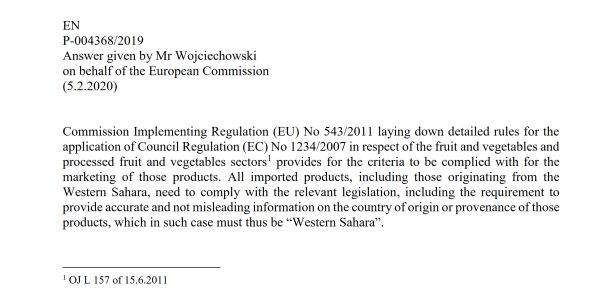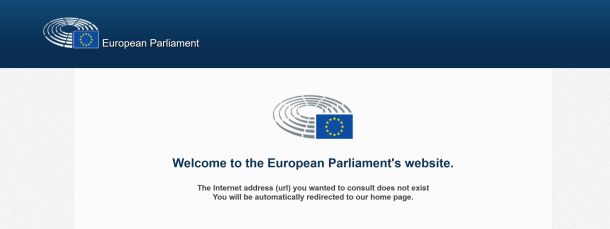
WSRW a demandé à la Commission européenne de préciser en quoi l'application de l'accord commercial proposé pour le Sahara Occidental à la seule partie du territoire sous occupation marocaine était conforme à son obligation de respecter l'intégrité territoriale.
Alors que le Parlement européen cherche à évaluer s'il va ou non soutenir l'extension de l'accord commercial UE-Maroc au Sahara Occidental, de plus en plus de questions se posent.

Western Sahara Resource Watch (WSRW) a adressé plusieurs questions à la direction générale de la fiscalité et des douanes de la Commission européenne (DG TAXUD), qui a dirigé la négociation de l'accord commercial entre le Sahara Occidental et le Maroc - le royaume d'Afrique du Nord qui maintient deux tiers du Sahara Occidental sont sous contrôle militaire depuis 1975. La question concerne l'application territoriale de l'accord proposé, qui semble se limiter à la partie du Sahara Occidental qui est sous occupation marocaine. Dans le même temps, le droit international impose à l'UE de respecter le principe de l'intégrité territoriale.
Retrouvez les questions de WSRW à la DG TAXUD dans le courrier ci-dessous (ou téléchargez en anglais).
La photo à droite montre la carte qui se trouve sur le site de la MINURSO, la Mission des Nations Unies pour l'organisation d'un référendum au Sahara Occidental. La ligne rouge représente le mur construit par l'armée marocaine pendant les années de guerre. Ce mur de sable fortifié par l'armée, s'étend sur 2 700 km, abrite 100 000 soldats marocains et les champs de mines les plus denses du monde. Téléchargez-la ici de la page de la MINURSO.
"Nous considérons qu'il est important que la Commission fournisse des éclaircissements afin que les membres du Parlement européen puissent prendre une décision en connaissance de cause. C'est comme si l'UE voulait négocier un accord commercial avec la Nouvelle-Zélande pour l'Australie mais mis en oeuvre seulement suer la Tasmanie. La signature d'un accord avec le Maroc couvrant le Sahara Occidental sans l'autorisation des Sahraouis constitue clairement une violation du droit européen et du droit international d'abord, mais encourage aussi les modifications des frontières ou la partition d'un territoire, simplement pour un accord commercial" affirme Sara Eyckmans de Western Sahara Resource Watch. "Si l'argument est le développement du territoire, alors pourquoi devrait-il être limité à la partie sous occupation marocaine ? bizarre pour acteur qui se dit neutre dans le conflit."
To the attention of Pierre Moscovici
European Commissioner of Economic and Financial Affairs, Taxation and Customs
Brussels
24 October 2018
Re. the partial territorial coverage of the proposed amendment to the EU-Morocco Association Agreement
Dear Commissioner,
Western Sahara Resource Watch is privileged to write to you. We wish to express our concerns about, and ask for your clarifications regarding, the territorial coverage of the proposed amendments to Protocols 1 and 4 to the Euro-Mediterranean Agreement establishing an Association between the European Communities and their Member States, of the one part, and the Kingdom of Morocco, on the other part.
As is reported in the Commission’s own Staff Working Document, Western Sahara is a divided territory: during the years of war, the Moroccan army undertook to construct a 2700km long wall that runs from the Moroccan-Western Sahara border southward across the territory, and into Mauritania. Today, that wall - where reportedly 100,000 Moroccan soldiers are stationed and which are effectively surrounded by the world’s densest mine-fields - continues to split the territory in two parts: about two-thirds of the territory are controlled by Morocco, while the remaining third is under control of the Front Polisario.
The part that is controlled by the Front Polisario - east of ‘the Berm’ - includes a coastal area, and areas that are being cultivated. Trade in agricultural, and to a lesser extent fisheries-, products is possible, and there is good potential to expand these sectors. It is our view - and we presume the European Commission to share it - that the people living on both sides of the Berm have a right to development. Accordingly, we find it concerning that the European Commission has the view that the currently proposed amendment to the EU-Morocco Association Agreement, which aims at integrating Western Sahara into the agreement’s territorial scope, will only apply to the area that is under Moroccan control, since the Joint Declaration explicitly states that the goods concerned are those “subject to controls by the Moroccan customs authorities”. We also refer to the Staff Working Document, which reads that “this report uses the term ‘Western Sahara’ to refer to the part of the territory administered de facto by Morocco”. We would be grateful if you could provide an answer to the following questions:
1. Can you confirm that the proposed amendment to the EU-Morocco Association Agreement does not cover the part of Western Sahara that is outside of Morocco’s control or goods originated therein?
2. If so, how does the agreement comply with the EU’s Treaty-based obligation to respect international law, of which the respect for the principle of territorial integrity is an integral component?
3. Is there a precedent for an EU agreement with a third territory that has only partial territorial coverage?
4. What is foreseen in order to allow EU trade with and in the part of Western Sahara that is under control of the Front Polisario?
5. How will you ensure that the agreement does not discriminate against the population living in the part of Western Sahara that is outside the coverage of the agreement?
6. How does the European Commission assess the partial coverage of the agreement to be in line with its stated commitment not to prejudice the status of the territory or the UN peace process, when in practice it will effectively reinforce the division of the territory through contributing to the development of only one part?
We would be grateful for your swift reply, as clarifications on this issue seems fundamental and urgent in order to ensure an open and transparent public debate over the Commission’s proposal and to allow Members of the European Parliament to make informed decision when they will vote on the proposal.
We look forward to hearing from you.
Sincerely,
Sara Eyckmans
Coordinator
Western Sahara Resource Watch
coordinator@wsrw.org
A copy of this letter has been sent to:
- HE Horst Köhler, Personal Envoy of the UN Secretary General for Western Sahara
- HE Colin Stewart, UN Special Representative for Western Sahara and Head of the UN Mission for the Referendum in Western Sahara (MINURSO)
La Commission de l'UE recule sur l'étiquetage des produits du Sahara
Quelle est la position de l'UE sur l'étiquetage des produits du Sahara Occidental occupé ? La Commission européenne a publié pour la troisième fois une réponse à une question parlementaire sur le sujet, mais la dernière version ne répond pas à la question.
Pourquoi cette déclaration de l'UE continue à disparaître ?
Une clarification de la Commission Européenne sur l'étiquetage des produits du Sahara Occidental a été publiée, puis supprimée, puis publiée à nouveau et a été supprimée à nouveau des sites Internet de l'UE.
Confirmation: les produits du Sahara Occidental à étiqueter comme tels
Il y a deux semaines, la Commission européenne a annoncé que les produits du Sahara Occidental doivent être étiquetés comme tels, pour retirer cette déclaration dès le lendemain. Aujourd'hui, la Commission réaffirme sa position initiale.
Retournement spectaculaire de la CE sur l'étiquetage du Sahara
Le 5 février 2020, la Commission européenne a annoncé que les produits du Sahara Occidental devraient être étiquetés en conséquence. Mais environ 24 heures plus tard, toutes les traces de cette déclaration ont été supprimées des sites Web de l'UE.



